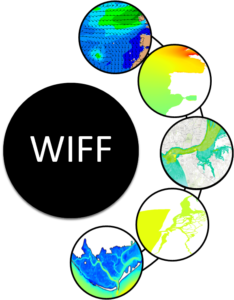In spite of the importance of coastal forecasts for both coastal management and coastal research, generic, site-independent tools to build these services are not available yet at European level. Current efforts are concentrated in site-specific deployments that are often of restricted access, promoting duplication of similar results in several providers and the need to build vast teams with little production gains.
The proposed OPENCoastS – On-demand Operational Coastal Circulation Forecast Services, is an innovative service providing on-demand circulation forecast systems as-a-service for the European Atlantic coasts. It is the first EOSC example in coastal engineering in Europe. Via its integration within European resources, it will be of great importance for coastal managers, public institutions, research groups and private sector with responsibilities in emergency and monitoring purposes across Europe.
The service is supported by INCD the Portuguese National Distributed Computing Infrastructure funded by the Portuguese Science Foundation (FCT). In the framework of EOSC-hub the integration of resources is done by Portuguese, Spanish and French partners.
Users and application potential
OPENCoastS can contribute directly to the development of new research methodologies and workflows regarding water quality, biological, biochemical and coastal erosion studies.
SMEs will benefit from these operational systems to feed their own higher-level service portfolios to respond to other societal needs, without the need to invest time and resources to deploy forecast systems from scratch.
Port and coastal authorities –This platform will provide coastal managers all the information required to fulfil their responsibilities (examples of uses include facilitating navigation, reducing port operation costs, reducing emergency planning and response of coastal hazards, and better exploring recreational uses of the coast)
Detailed description
OPENCoastS builds on-demand circulation forecast systems for user-selected sections of the North Atlantic coast and maintains them running operationally for the timeframe defined by the user. This daily service generates forecasts of water levels, 2D velocities and wave parameters over the spatial region of interest for periods of 72 hours, based on numerical simulations of all relevant physical processes. Forcing conditions at the boundaries and over the domain are defined by the user from global forecast databases (including global Copernicus-based CMEMS circulation forcings) or by user-uploaded files. Automatic comparison with real-time in-situ sensor data can be provided for a number of user specified locations.
It takes advantage of LNEC’s team long-term work on coastal modelling as model developers, integrated in several open source modelling communities (SCHISM, ELCIRC, SELFE, ADCIRC) as well as coastal science researchers tightly coupled to advanced competences in developing forecast frameworks and operating forecasts deployments.
Background from Ibergrid partners
Coastal forecast systems have start to be deployed by LNEC in 2008, following a long term collaboration with CMOP (USA), integrating IT and coastal modelling competences to address a recognized demand by the coastal managers and port authorities.
Currently, the service is part of LNEC’s catalogue of site-specific research and advanced consultancy services (see for example http://www.lnec.pt/hidraulica-ambiente/en/core/information-technology-in-water-and-environment-research-group/activity-2/ or http://ariel.lnec.pt ). In this scope it has been deployed at several sites (Atlantic ocean for waves and water levels, Aveiro lagoon, Tagus estuary and Lisbon drainage system and Faro lagoon). These services continue to be used by research partners after the end of these projects for their educational and research activities, as well as by the involved end-users for their management tasks (National and Local civil protection agencies, Port authorities).
The site-specific service is already part of the set of services supported by the Portuguese NGI – Portuguese National Distributed Computing Infrastructure (INCD), integrated in their catalogue of services. LNEC’s wave forecast service is also integrated in the National Authority for Maritime Resources (DGRM) ocean data portal.

